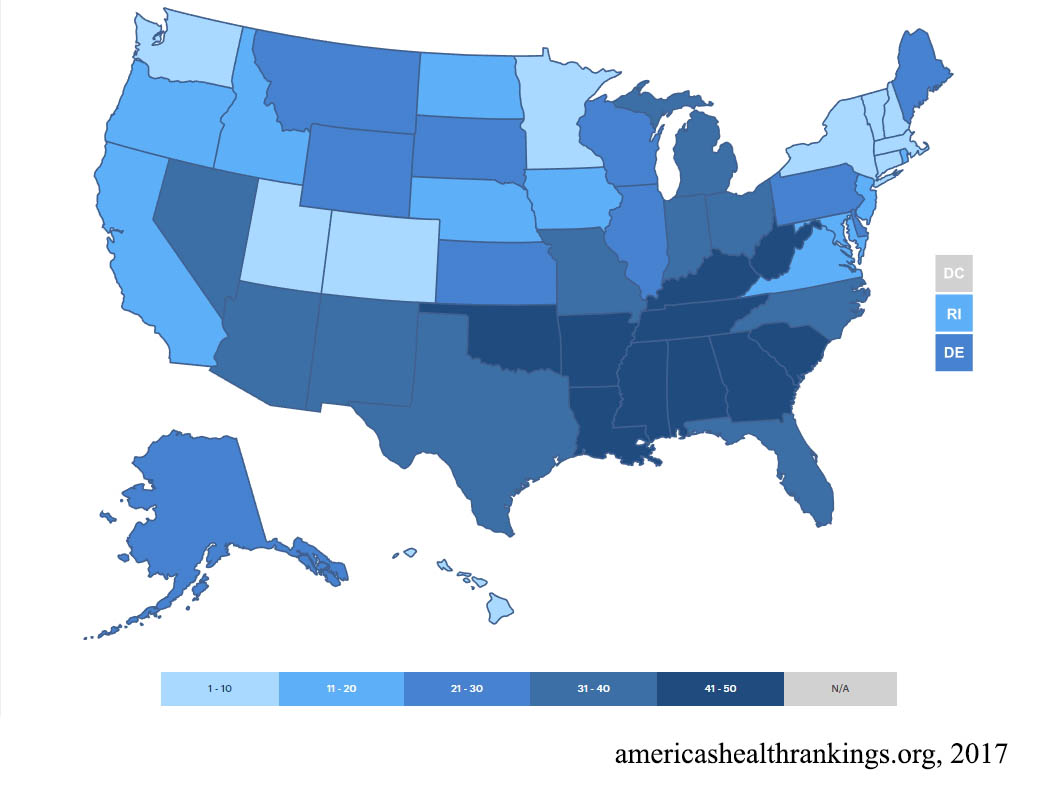 United Health Foundation’s latest America’s Health Rankings of states came out this week, and as the leader of a health-focused foundation in Missouri, I have to say that the results were disheartening. Put simply, from a health and well-being perspective, Missouri is not doing well, and we’ve been getting worse. We ranked 40th for our overall health ranking, and the long-term trends make the situation even more serious. In 1990 we were squarely in the middle—24th place—meaning that we’ve tumbled 16 places in 27 years. We should all be alarmed by this decline, yet focused on answering a difficult but fundamental question: How and why is our state failing to fulfill its obligations for the health of its citizens, and what can be done?
United Health Foundation’s latest America’s Health Rankings of states came out this week, and as the leader of a health-focused foundation in Missouri, I have to say that the results were disheartening. Put simply, from a health and well-being perspective, Missouri is not doing well, and we’ve been getting worse. We ranked 40th for our overall health ranking, and the long-term trends make the situation even more serious. In 1990 we were squarely in the middle—24th place—meaning that we’ve tumbled 16 places in 27 years. We should all be alarmed by this decline, yet focused on answering a difficult but fundamental question: How and why is our state failing to fulfill its obligations for the health of its citizens, and what can be done?
The decline in Missouri’s health since 1990 was little noticed from year to year, but is startling when viewed in totality. It hasn’t been a steady drop, we hit 40th place in 2011 and 2012 before rising briefly again, but we’ve ranked 30 or worse since 1991. Our 16-point fall in overall health rankings among states was the single largest drop anywhere in the country outside of North Dakota, which fell 17 places, from 1st to 18th.
The rankings use a comprehensive view of the issues that influence health outcomes. Factors such as clinical care, policy, personal behaviors, and community/environment are all combined to give a broad look at the health of the region. Particular challenges like high rates of smoking, violent crime, and low immunization rates were issues that led to our state’s poor ranking, but Missouri’s showing across the board was subpar.
Why are we losing ground compared to other states? The list of contributing factors is long; here are some well-known highlights:
- One of the lowest per-capita spending rates for public health funding in the country
- Lowest in the country tobacco taxes that, if raised, could significantly reduce smoking rates and generate needed state revenue
- An opioid epidemic, firearm violence, and rising suicide rates
- Lack of affordable health insurance coverage
- Climbing rates of obesity
- Unacceptable levels of infant mortality
- Decades of underinvestment in our human capital via education and job training, as well as basic community infrastructures that support health
- Inadequate access to clinical care
- A fraying social safety net
The suffering is widespread. Early in 2018 we will publish a report on the unprecedented rise in mortality rates for white Missourians, particularly in rural areas. African-Americans in urban St. Louis also face a difficult set of challenges, as was reported in the For the Sake of All project. Though these two reports show a dire situation, they both include recommendations for a path forward. We as a society must heed these calls to action.
In Missouri we have many strengths, but they have been insufficient to prevent our decline. We all play a part in being responsible for the factors contributing to our poor health outcomes, and we all have a role to play in changing our state’s downward trajectory. We can make changes through personal behavior, policy opportunities, organizational improvements, community action, and working together across societal sectors. It will require sustained attention and commitment. It will require leaders from business, government, and the nonprofit community to work together. And, it will require citizens from all walks of life to engage and participate vigorously in moving the state toward a healthier future.
America’s Health Rankings are produced to stimulate action for improvement. Will Missouri heed the wake-up call provided by these latest findings? For the benefit of our children and the future of our state, I hope so.
Interested in republishing or repurposing our content? Please reach out to our Strategic Communications department to seek permission. Approval is on a case-by-case, per-article basis and is not guaranteed.



